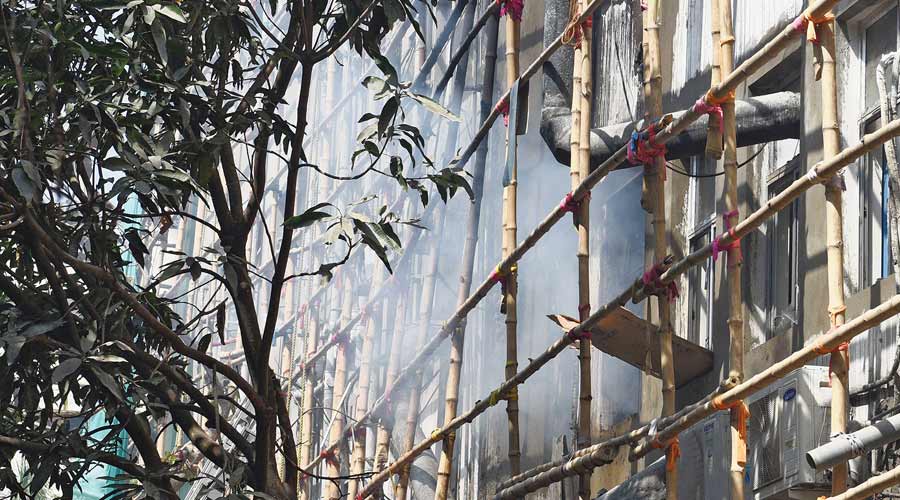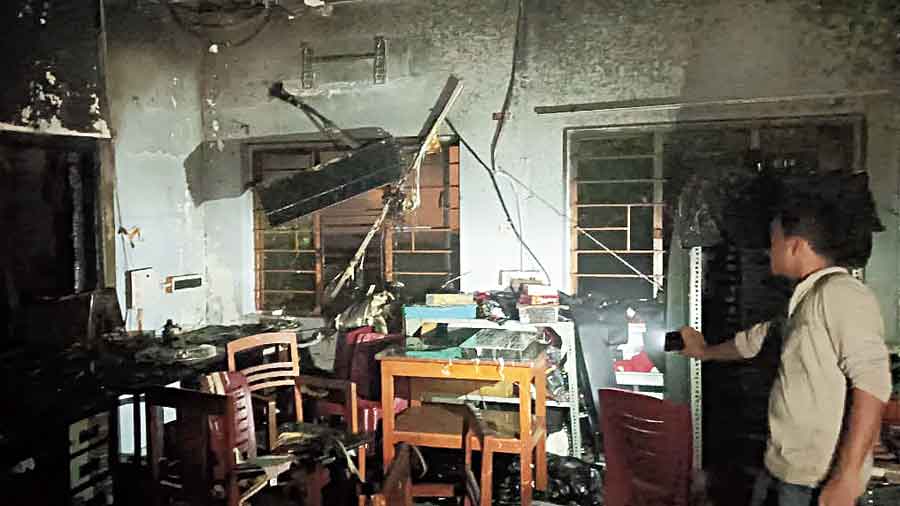A fire broke out at the 87-year-old Indian Institute of Chemical Biology (IICB) in Jadavpur on Monday afternoon, gutting a laboratory, causing some damage to another and triggering a series of explosions.
Panicked researchers rushed out, some almost choking on the black smoke emanating from the fire-hit labs. Police said there were no reports of anyone having been trapped or injured.
Ten fire tenders were pressed into action to douse the flames on the first floor of the six-storey building opposite the Jadavpur University campus.
Fire department officials said fire tenders from the Gariahat unit reached the spot late because of a road blockade in Jadavpur, forcing officials to mobilise tenders from Patuli.
By the time fire tenders reached IICB, there had been multiple explosions inside the building and an internal wall separating two laboratories had collapsed.
Sources in the IICB said a first-floor laboratory whose in-charge is Ranjan Jana, principal scientist, organic and medicinal chemistry, had caught fire. The cause of the fire is yet to be ascertained, police said.
Jana, who was not in the laboratory when the fire broke out, declined to comment when contacted.
A research scholar who was working in an adjacent laboratory told The Telegraph that they stepped out after the fire alarm went off and found the corridor engulfed in thick fumes.
“We were almost choking on the thick black smoke. Those present in the lab took their bags and rushed to the exit,” said the scholar.
The institute’s director, Arun Bandopadhyay, said the laboratory where the fire broke out was gutted. An adjoining laboratory suffered some damage after the flames spread to it following the collapse of the wall separating the two, he said.
The director said the fire could be easily contained because the alarm system functioned effectively.
“We could evacuate all students fast as the fire alarms went off in time. My office is on the same floor as the fire-hit labs. As far as the loss of data is concerned, that is retrievable because the data is on the cloud,” he said.
According to him, the research scholars initially tried to douse the fire with portable fire extinguishers. “But as the flames could not be contained, they rushed to the exit. All of us had to step out of the building,” the director said.
A preliminary inquiry by the police and fire department officials revealed that there were more than 30 gas cylinders inside the building, one of which exploded.
A fire department official who was in the team that inspected IICB said the fire spread to a second lab after an explosion caused the wall between the two to collapse.
“There was no damage to the external walls. Nor was anyone injured,” said a senior officer of the state fire and emergency services.
Another research scholar told The Telegraph that the first floor was dotted with organic chemistry laboratories. “Since it was Monday, all the labs had almost full attendance,” he said.
Several researchers said it was normal for a laboratory that does research in chemistry to stock gas cylinders.
The fire triggered panic calls from parents to children or their research guides. An official of the institute said many of the students at the institute were from outside Bengal.
A forensic team will visit the spot on Tuesday to collect samples from the affected floor and ascertain the origin of the fire.
The Indian Institute of Chemical Biology was established in 1935 “as the first non-official centre in India” for biomedical research. It came under the Council of Scientific and Industrial Research (CSIR) in 1956.
The institute has been engaged in research on diseases of national importance and biological problems of global interest.

